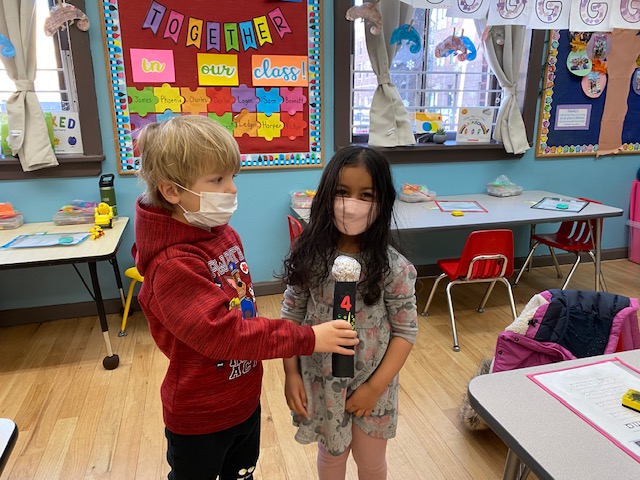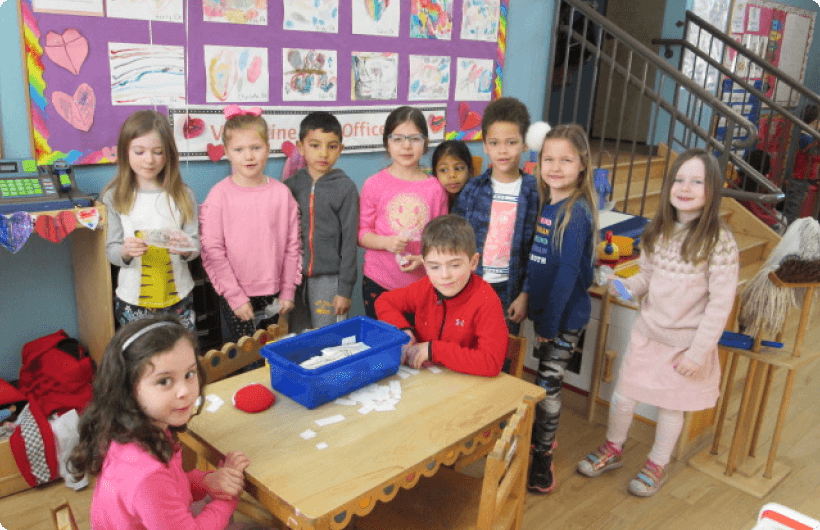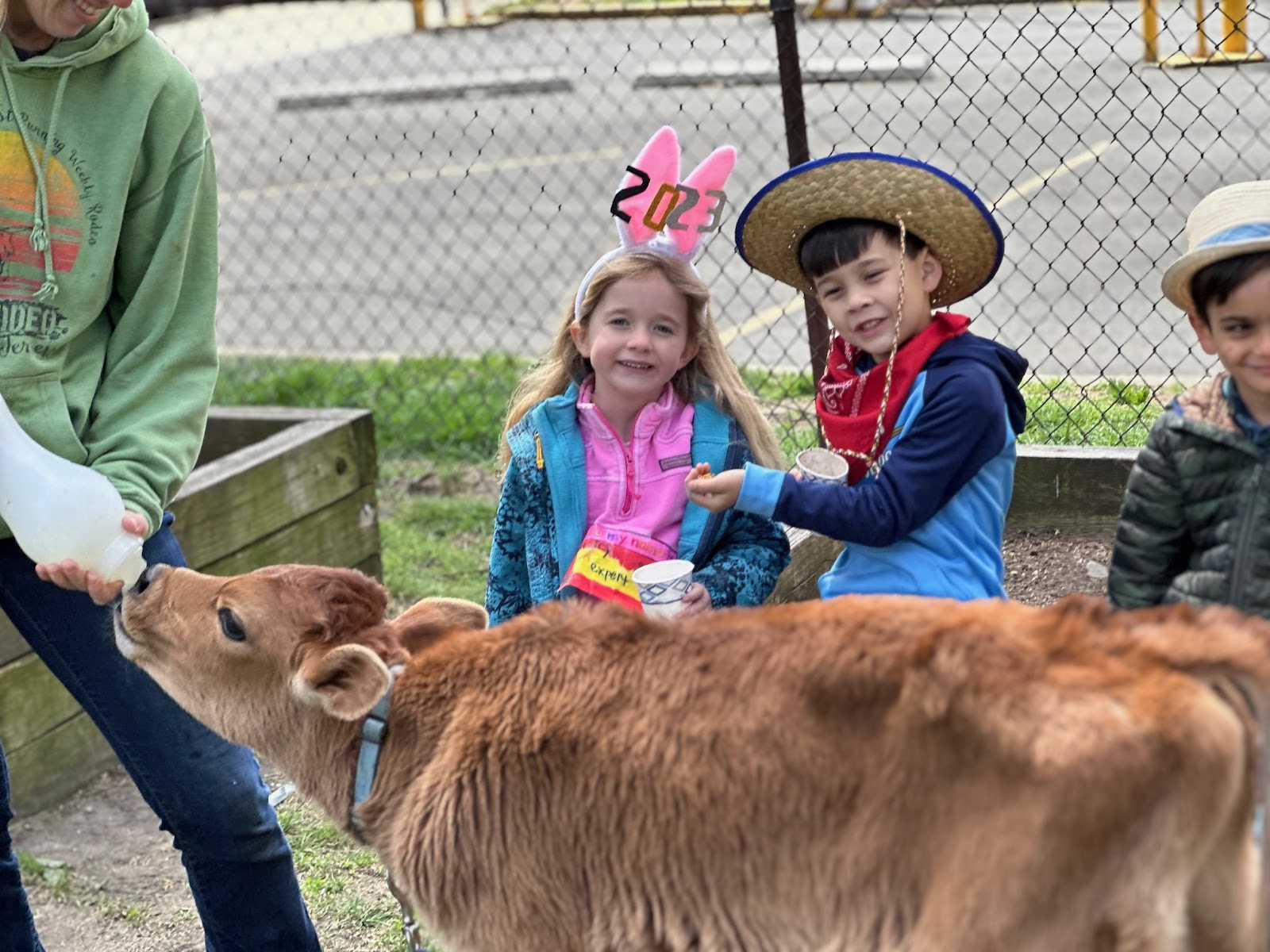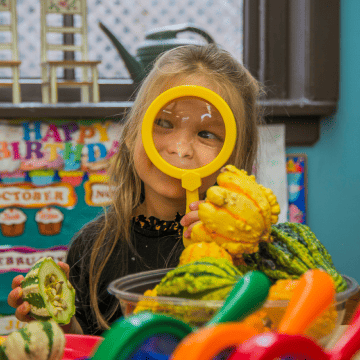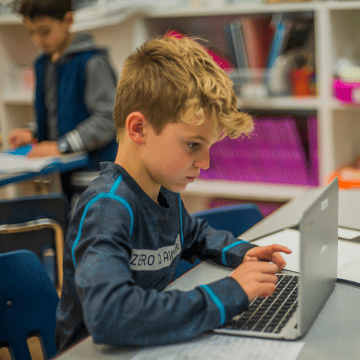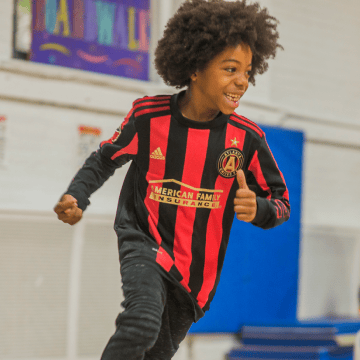Pre-K3, Pre-K4 AND KINDERGARTEN
Early Childhood
Students attend half-day or full day Pre-K3, Pre-K4 programs and attend full day for Kindergarten. Our creative curriculum is based on the belief that early childhood learning is best lived out in small, well-defined centers where children can work at their own pace and discover things in their unique way.
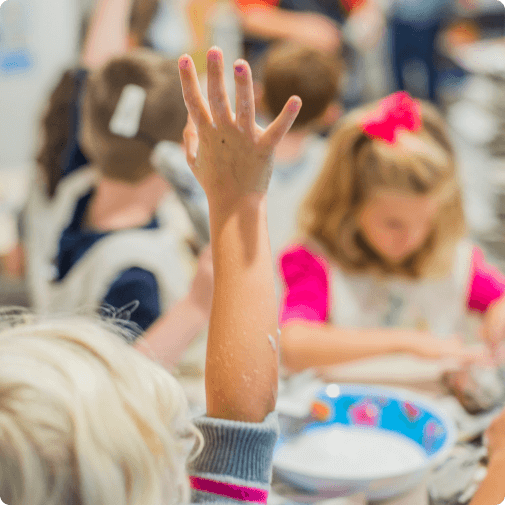
At All Saints, early childhood learning is a time for exploration and discovery.
Our classrooms are arranged into small, well-defined centers where children can work at their own pace, create plans for their play and learning, and follow their own interests – all in the context of learning to be part of a larger community. When children are given the freedom to experiment, to make mistakes and then to learn from those mistakes, they are developing skills that will foster a lifetime of authentic and productive learning. Working with blocks, sand or paint lays the foundation to develop important problem-solving, reading, math and science skills.
Milestone Projects
The People Who Make Our Community Run
Students brainstorm with their teachers and create a list of questions to ask the members of the All Saints Community. During the interview process, they begin with simple questions such as “What is your favorite color?” or “Do you have a pet?” They also ask each interviewee about his/her favorite book and listen to the book read aloud. After a few rounds of interviews, students begin to think of new and interesting questions to ask their interviewees, including “What is your favorite food?,” “Do you have a computer?,” What are your favorite cloud shapes?” and “What is your favorite healthy food?”
After the interviews are complete, the information from each interview is recorded on a summary sheet by the teacher and is compiled into a class book that lives in the classroom library. Finally, the students create special thank you cards for each person who visited.
Pre-Kindergarten ~ The All Saints Post Office
To initiate this project, Pre-K students study the various roles of postal workers in the community and visit the Hoboken Post Office on Washington Street. After learning about how a real post office works, students work to convert the dramatic play center into a working post office. They build a mailbox for receiving mail to put in an area accessible to the school community and another mailbox to be kept in the classroom. The students also make mailbags out of paper bags to transport the mail on their routes throughout the building.
To inform the community about their school-wide service operation, students make and hang signs around the school building to let customers know of times when the post office is open. Students also design their own stamps, which sell for $.10 each. When the post office is open, the Pre-K students are able to utilize the various skills they have learned throughout the year to sort and label the mail and prepare it for distribution.
Over this two-week period, all of the students assume various responsibilities in the center. They serve their customers by selling stamps, sorting mail, and delivering mail. During business hours, the Pre-K classroom is a very busy place! To add even more meaning and purpose to the project, profits from the sale of stamps are donated to a charity of the students’ choice. The class discusses different charities that could benefit from the money and then votes to choose a charity. Subsequently, they visit the charity and present the money to a worker there.
This comprehensive milestone project is an important learning experience for the students in Pre-K. It allows them to engage in a deeper and more meaningful study of their unit on Community Helpers. This project also leads to the development of important math skills, including work with money (when selling stamps) and sorting (when receiving and distributing mail). The students also learn pre-reading and writing skills when reading envelopes and making posters. Finally, this project allows the students in the Pre-K classes to develop a sense of responsibility and teaches them the importance of working cooperatively with peers to get the job done.
Farm Day
As part of this study, the students learn about all aspects of the farm and take various field trips to support their studies. Early in the year, the class gets a close-up look at a real farm when then travel to a pumpkin patch. On this exciting field trip, students are able to see a variety of crops and animals, enjoy a hay ride and pick their own pumpkins. As the year continues, the Kindergarten students discuss the different jobs required on the farm and the role that farms play in society. The class takes a walking trip to a local grocery store that carries a large variety of fresh fruit and vegetables. From this experience, students gain a better understanding of where produce is sent and sold after it leaves the farm. This provides an interesting link between farm life and the urban life with which the students are familiar.
The classroom comes alive when the dramatic play area is transformed into a farm! Students are able to engage in imaginative play using plastic farm tools, farm animals, and a variety of plastic fruits and vegetables. The doll house is replaced by a barn, complete with animals and props. The students also have the opportunity to work on a live class garden and read farm-themed books throughout the year.
In advance of Farm Day, the students conduct a more detailed study of farm animals while also honing their technology skills. Each student is assigned one animal to research using the internet, books, and other resources. Once their research is complete, each student creates a poster about his or her animal. These posters are used as information boards during Farm Day.
The year-long study culminates in Farm Day, which occurs during Week of the Young Child in the spring. The Kindergarteners act as hosts for the event and have many jobs to ensure the day runs smoothly. They create and collect tickets, stamp the hands of visitors, help care for the visiting animals, create information boards, and conduct tours for their visitors. Kindergarten students are excited to share their knowledge of farm life with their teachers and peers.
An Overview of our Early Childhood Curriculum
Pre-K3
During the Pre-K3 year, many students are entering school and venturing outside the safety of their families for the first time. To help them transition into the school community, All Saints’ curriculum focuses on the following Learning Themes:
Welcome to School, All About Me, Feelings, Friendship, Fall Harvest, Exploring Holidays, Winter, Community Helpers, Farm, Spring, Summer and the Ocean.
In the Pre-K3 class, and throughout the early childhood program, learning themes are introduced a month at a time. During group meetings, students help read the daily message, engage in music and movement activities (including songs, action poems and fingerplays), and explore concepts such as colors, shapes, letters and numbers.
In the Library Center, the students learn critical language skills from reading books. They enjoy time reading alone and with others. They also practice important oral language skills when they make up stories to go with the pictures they see. The books in the Library Center are changed as the learning themes rotate throughout the school year.
In the Blocks and Manipulative Center the students learn about gravity, stability, weight, balance, and systems. Students also learn about depth, width, height, length, shape and balance. Students focus on counting and number recognition during morning meeting activities with the calendar. Other units of focus include sorting, classifying, patterns, sequencing, graphing, and measurement.
In the Science and Discovery Center, the students explore a variety of scientific tools such as magnifying glasses. They learn about magnets, plants, and other items of scientific interest. The Pre-K3 classrooms have sensory tables where the students can learn practical math skills when they pour sand and water from one container to another. Students are also engaged in nutrition projects and learn new vocabulary as they are exposed to different ingredients. They learn basic measurement skills, and can appreciate the cultural ties to foods as they are prepared and served.
Pre-K3 Students partake in several co-curricular activities such as music, dance, and world language. Please see our Beyond Core Academics page.
Pre-K4
During the Pre-K4 year at All Saints, curriculum is focused on the following Learning Themes: Look at Me, I’m Growing, Fire Prevention, The People who make our Community run, Changing Seasons, Winter and Hibernation, Valentine Post Office, Spring, Transportation, Insects and Spiders, Dinosaurs, and Getting ready for Kindergarten. During group meetings, students help read the daily message, engage in music and movement activities (including songs, action poems and fingerplays), and explore concepts such as colors, shapes, letters and their sounds, and numbers.
In the Library Center, the students learn critical language skills from reading books. They enjoy time reading alone and with others. They also practice important oral language skills when they make up stories to go with the pictures they see. The books in the Library Center are changed as the learning themes rotate throughout the school year. In Pre-K4, students engage in Author of the Month studies.
Students continue to explore the concepts taught in Pre-K3 including stability, weight, balance, width, height, length, and shape while working in the Blocks and Manipulatives Center. Students expand their knowledge of numbers, working on numbers 0-100. Other units of focus include patterns, sequencing, graphing, measurement, money, and time. With a growing number sense, students begin to practice adding objects together and discuss associated mathematical language.
In the Science and Discovery Center, the students explore a variety of scientific tools including balance scales, magnifying glasses, microscopes, and measuring tools. They learn about living things as they engage in planting and study the life cycles of butterflies. They learn about basic scientific principles such as sinking and floating. The Pre-K4 classroom has a sensory table where the students can learn practical math skills when they pour sand and water from one container to another. Materials are changed to support the classroom themes. They learn about number, color and size when they play with objects in the center.
Pre-K4 Students partake in several co-curricular activities such as music, dance, and world language. Please see our Beyond Core Academics page.
Kindergarten
For many of our Kindergarten students, this year is the first time they will be spending a full day at school. As such, teachers are intentional about designing the daily schedule to include not only the academic areas described below, but also to allow for breaks and quiet rest times, snacks, and outdoor play. Five-year-olds need time to explore the “real world” in the classroom and love to role-play, dress-up and play with puppets. The dramatic play centers in our Kindergarten classroom are transformed throughout the school year to reinforce learning.
The themes covered in Language Arts are culturally diverse selections which keep children’s interest, as well as incorporate other disciplines including science, math and social studies. Specific phonemic awareness concepts covered in Kindergarten include: beginning sounds, rhyming, blending and segmenting onset and rime, blending and segmenting phonemes, and initial and final phoneme substitution.
In Kindergarten, teachers use the EnVision Mathematics textbook to support the classroom curriculum, which gives students an early foundation for beginning math skills. The clear step-by-step instruction supports student comprehension and skill development. Each lesson is customized to match student abilities. In this program, students build on their foundational number sense and math skills by using manipulatives and exploring a variety of mathematical concepts and activities.
Students in Kindergarten are natural observers of the world around them. The Kindergarten science curriculum is designed to help students understand that when they observe, they are acting as scientists. We lay a foundation for the study of science by introducing the basic scientific processes: observing, comparing, classifying, measuring, and communicating. Students become observers and record keepers, and are given the opportunity to look at the world around them through this new lens. Through the hands-on curriculum, students engage in the five E’s science instructional model (Engage, Explore, Explain, Extend, and Evaluate.)
Students in Kindergarten begin the year learning about themselves and their families to lay the foundation for exploring the world around them. This class also represents a time for students to think about their place within the classroom and school community, and to learn about the needs and desires of others. Branching out from the classroom community, students expand their focus, and begin to discover the school community, as well as the larger Hoboken community.
Kindergarten Students partake in several co-curricular activities such as music, dance, and world language. Please see our Beyond Core Academics page.

“It’s amazing to see our youngest friends change over the course of their early childhood years, developing the academic skills they need to go to the ‘big school’ for First Grade and beyond. It fills me with pride to see my students’ accomplishments first hand and to watch them develop into caring, mature adolescents.”
Allison Hrbek, Pre-K4 Teacher
We'd Love to Hear from You:
LOCATIONS
707 Washington Street, Hoboken, NJ, 07030
527 Clinton St, Hoboken, NJ 07030
CONTACT

